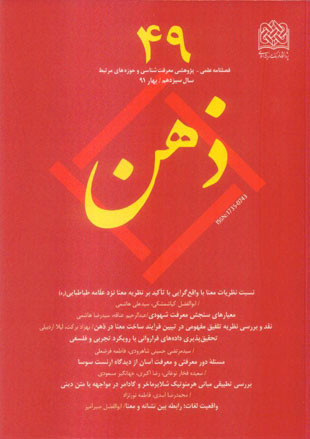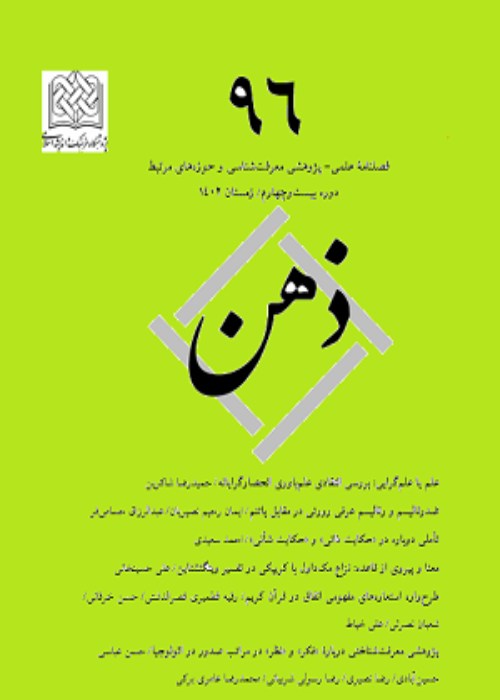فهرست مطالب

فصلنامه ذهن
سال سیزدهم شماره 1 (پیاپی 49، بهار 1391)
- بهای روی جلد: 60,000ريال
- تاریخ انتشار: 1391/02/26
- تعداد عناوین: 7
-
-
صفحه 31
-
صفحه 149
-
Page 5This article comments on some of the most important theories of meaning about words in The West. And also we will discuss about relation between this theories and Semantic realism of meaning.These theories are:A) The descriptive theory of meaningB) The referential theory of meaning C) The Usage theory of meaning Then we will try to extract Tabatabaei theory of meaning from his works. ThisdebateonIslamicphilosophyhas been describedin othermanner that have arisen in the contemporaryWests philosophy. In this paper, Tabatabaei theory of meaning is presented by the literature of Western Philosophy, until comparing the Allameh theory with alternative theories to be possible. Since the theory of semantics and theory of epistemology from a philosopher must have consistency and coherence anddiscussionsinthese twolayersareinterdependent; Withregard tothisdoctrine, in this article, Allameh theory of meaning is extracted of his works. According to Allameh, knowledge is divided into two categories: presential knowledge (knowledge by presence) and acquired knowledge. And acquired knowledge itself is divided into two categories: the natures (Maheyyat) and conventionals (Etbariat). And concepts of conventional (Etebari) also to both the precommunity (Ma Ghabl Ejtma') and the pastcommunity (Ma Bad Ejtma')is divided.According to Allameh, For eachregion of awareness,thereisspecial theory of meaning. Inthis article, you will see thatthe Allamehtheoryofmeaning in knowledge by presenceandnature (a bunch of acquired knowledge) with thereferentialtheoryof meaninghas beenadapted. Becauseknowledgein these two areas, subjectsomehow access to the referents of these concepts. Andinthe precommunity conventional (Etebariat Ma Ghabl Ejtem') with descriptive theory of meaning and inthe postcommunity conventional (Etebariat Ma Bad Ejtema') with usage theory of meaning has been adapted.Keywords: Theory of meaning, Allameh Tabatabaei, the descriptive theory of meaning, the referential theory of meaning, the usage theory of meaning, semantic realism, semantic Incommensurability, epistemological realism, ontological realism
-
Page 31It is probable to make a mistake in apocalypse, intuitive insight and its interpretation. As the occurrence of some theoretical and practical mistakes in theosophy and the contradictions among the theosophist's intuitions have challenged the validity of apocalypse and intuition, it seems important and necessary to have a criteria for distinguishing the true revelations from the false ones. Acknowledging the existence of error and mistakes and contradiction in different stages of apocalypse and intuition, the aim of this study is to introduce and investigate the most important criteria that have been stated in the theosophists literature for distinguishing the true revelations from the false ones.Keywords: Insight, Apocalypse, Intuition, Quran, Theorem, Infallible, Educator, Professor
-
Page 53Findings of cognitive sciences, in general, and cognitive linguistics, in particular, show that humans astonishing mental capacity in making counterfactual scenes is partly, because of his cognitive ability in conceptual blending. This cognitive ability allows human to create and understand novel meanings which recently has been counted as an important mechanism of creative minds. This paper is trying to introduce and criticize conceptual blending theory and its explaining role in meaning construction process. Therefore, firstly it introduces conceptual blending theory, its concepts and four-spaces model and then considers the criticisms that have been raised about this theory.Keywords: Cognitive linguistics, Conceptual blending theory, G. Fauconnier, M. Turner, meaning construction process, mental spaces
-
Page 73Parapsychology discusses the human supernatural (paranormal) abilities. There are two major types of these potentials: mental and physical. There are also two major approaches for justifying parapsychological phenomena: in the point of view of some scientists these visual events occurred by natural causes which are unknown for several reasons. Some factors such as weakness of the measurement tools, the viewers eyesight and the large magnitude and uncontrollability of the data has been made the scientists not to have a definite and accepted opinion about them. Another group believe that the parapsychological events occurred by natural causes or psychotic disorder. It is Irrefutable that these nonconventional events existed in the human life. In addition to a quick look to the history of the parapsychology science which is nowadays reduced to pseudoscience, this paper investigates the potential of the data in this science to be introduced and investigated as the scientific issues by two, experimental and philosophical approaches.Keywords: Parapsychology, Paranormal, to be introduced, investigated, Selective Perception, Scientologism, Rationalism
-
Page 103The Epistemic Requirement Principle says:A knowledge source K can yield knowledge for S only if S knows that K is reliable. If we affirm KR, we face the problem of vicious circularity Because we attain the knowledge that our epistemic sources are reliable, through beliefs derived ultimately from that epistemic sources. But if we deny KR, we have another problem is known easy knowledge. This problem is that once we deny KR we come to know our faculties are reliable in ways that intuitively are too easy. There are some solutions about this problem among these sosas suggestion that deny KR in Animal knowledge and accept KR in Reflective knowledge. He maintains that we have virtuous circle in Reflective knowledge.Keywords: Epistemic circularity, Easy knowledge, Knowledge Requirement Principle, Animal knowledge, Reflective knowledge
-
Page 121Deep correlation between religious culture and interpretation of religious texts in oracle and divine voice based societies causes theologians to face new questions about newly developed theories. The major problems include the matter of interpretation finding the authors intention and reaching an objective understanding of infinite process of and understanding. The present study aims at comparative analysis of Schleiermachers and Gadamers hermeneutics ideas on interpretation and comprehension process which is also transmittable to religious text interpretation.Keywords: religious understanding, interpretation, objectivity, relativity, hermeneutics
-
Page 149An interesting fact about the meaning of words is the compulsion to perceive them; when we encounter a symbol, we perceive its meaning without the least mental effort. In this paper, I have tried to answer the question How does the meaning of a word impose itself on us? and in this way, find an answer to the question How does a symbol become meaningful and what is the meaning of a symbol? Here, by emphasizing the time when we have an understanding of a word, I introduce the reality of words versus the language convention, which is a historical issue. Then, by distinguishing between giving meaning to words and their having a meaning, I seek to show how, just like a reality, a word has a function appropriate to its unique character. We replace an independent entity called meaning with this function of understanding. Eventually, by distinguishing between the language act and the speakers act, I try to show that the creative aspect of language is related to the layer of the language act rather than the speakers act.Keywords: reality of words_language convention_live time of understanding_giving meaning_having a meaning


